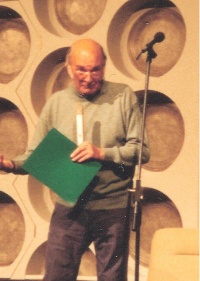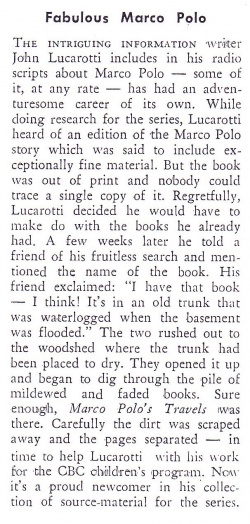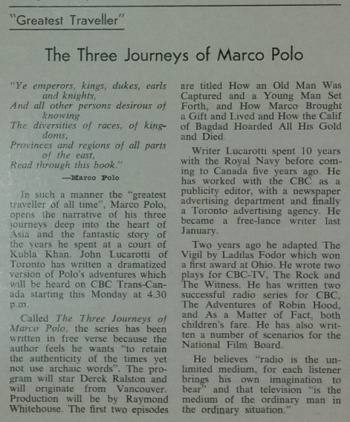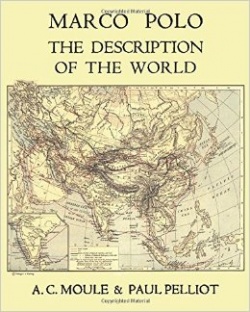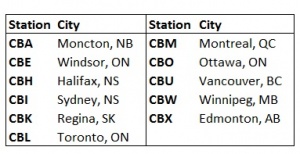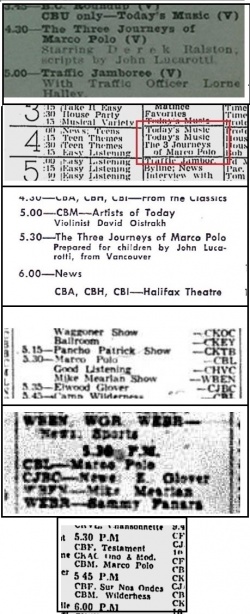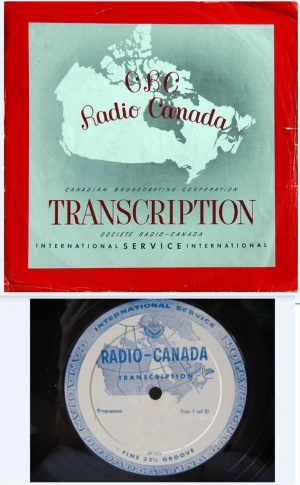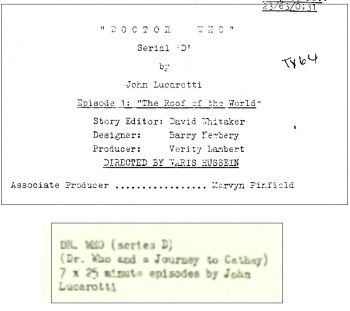Radio Marco
Before Doctor Who:
The Three Journeys of Marco Polo
Among the early episodes of Doctor Who, perhaps one of the most missed is the fourth serial, the seven part Marco Polo that was first aired in the spring of 1964. Unfortunately, the entire serial is missing but complete off-air audio recordings exist.
The author of the Marco Polo serial for Doctor Who was John Lucarotti. He remembers the Marco Polo serial as a defining point for the young series:
- "In Marco Polo Bill (Hartnell) found his direction and crystallised his performance with the authority and stature he brought to it for the next three years." - John Lucarotti, quoted in The Doctor Who File by Peter Haining (W.H. Allen: 1986).
It is quite well-documented that Lucarotti had to some degree based his seven TV scripts on an adaptation he had written several years earlier for Canadian radio. In the few interviews that Lucarotti had given about his work on Doctor Who, he often mentioned the radio serial that inspired his TV scripts. But there was always some confusion -- even by John himself! -- as to how many episodes there were as well as the year in which it debuted:
- "… I remembered that I had written a fifteen-part, half-hour radio serial in Canada during 1956 about the three journeys of Marco Polo and, seven years on, I still had my notes and a copy of his diary".
- "... There was a superb character actor named Martin Miller who played Kublai Khan, but the characterization was not my invention. In the original radio version I had written him as 'the mighty Khan' but the director had the actor play the role completely against the lines…"
- John Lucarotti (The Doctor Who File, Peter Haining; W H Allen, 1986)
- "I had done Marco Polo as a fifteen-part radio series in Canada for CBC, about five years earlier. The Doctor Who one was a totally new script of course, but the radio version certainly had an influence on it ... I'm all for a painless history lesson and find the 'Three Journeys of Marco Polo' fascinating."
- John Lucarotti (Doctor Who Magazine, Marvel; issue 124, May 1987)
- "John Lucarotti … scripted an 18-part series about the life of Marco Polo for the Canadian Broadcasting Corporation … remembering his CBC series, he chose Marco Polo as his subject".
- David J Howe, Mark Stammers, Stephen James Walker (Doctor Who – The Sixties, Virgin Publishing Ltd, 1992)
- "John Lucarotti … wrote for radio with the Canadian Broadcasting Corporation in the mid-Fifties. In 1956 he wrote a fifteen-part radio serial about the travels of the thirteenth century Venetian explorer…"
- Andrew Pixley (Doctor Who Magazine, Marvel; issue 240, 3 July 1996)
Other than these few sound bites, very little else is known or documented about the radio serial, including its title, who was in the cast, when and where it aired. We thought we'd do some digging to find out.
John Lucarotti
Author John Lucraotti (20 May 1926 – 20 November 1994) had a long a varied career that spanned over four decades. Of course, he is best remembered by Doctor Who fans for writing the three William Hartnell Doctor Who serials: Marco Polo (story D, 1964), The Aztecs (story F, 1964) and The Massacre of St Bartholomew's Eve (story W, 1966). He subsequently novelized these three scripts for Target Books.
He also wrote the original scripts that formed the basis of the 1975 Tom Baker serial, The Ark in Space. As John was living on a boat in Corsica at the time he was unable to contribute further to the project and the script was rewritten by Doctor Who script editor Robert Holmes and John received no onscreen credit for the piece. (Although somewhat bizarrely, he is credited as the writer in the newspaper listings for The Ark in Space that appeared in Denmark!)
Later in life, John inserted himself in the Doctor Who universe again when he wrote a 'Brief Encounter' short story for DWM issue 167 (November 1990), in which he meets the First Doctor in a French bar, and later produced a short story based on his unused script idea featuring the Doctor and Eric the Red, which appeared in DWM issue # 184, published in February 1992.
John was born in Aldershot, England in 1926 and spent 10 years in the Royal Navy during and after the Second World War. After moving to Canada in 1950 he pursued his interest in writing and developed well over 200 scripts for the Canadian Broadcasting Company (CBC) and became a Canadian citizen. While working for the CBC, a radio play of his won a prestigious First Award in 1953 from the Ohio University Institute for Education by Radio-Television. He later returned to England to write for the theatre and British television where he contributed a prolific number of scripts for a wide range of programmes, including 10 episodes of The Avengers.
It was while working for the CBC in 1955 that he was commissioned to write a multi-part dramatic radio serial intended for children based on the travels of Marco Polo…
Researching Marco Polo
Lucarotti was well known for his meticulous research. As shown in the 1964 article from the Yorkshire Evening Press (HERE) he carefully researched the original journals of Marco Polo for the TV serial, and later performed detailed research on Aztec civilization to write that serial (he also lived in Mexico for a few months).
The Canadian Broadcasting Corporation recognized John’s talent and dedication and the CBC Times featured an article soon after the 1955 launch of the radio series that detailed how far John was willing to go to research a topic.
John was looking for an out-of-print book on Marco Polo for weeks and was at the point of giving up when a friend told him he may have a copy but that it was inside a waterlogged trunk recovered from a flooded basement. The two discovered a copy of Marco Polo’s Travels along with other water-damaged and mildewed books in the trunk and by carefully removing the dirt and separating the pages he was able to salvage the book in time to help him with the Marco Polo radio series!
- This rare book was possibly the one written by John Masefield and published in 1918.
- However, in Doctor Who – The Key to Time (W H Allen, 1984), Peter Haining includes an extract from an undisclosed newspaper dated 22 February 1964, in which Lucarotti identifies a different book to be the one he had based his story on, being "Marco Polo's own diaries, Description of the World… "
- Authored by Arthur Christopher (A C) Moule and Paul Pelliot, published in 1938, Description is regarded as the definitive translation of Polo's original diaries. Indeed, the structure of the book reads very much like that of a narrated travelogue – which as we know was a dramatic device used by Lucarotti for the Doctor Who script, having Marco provide a first person narrative by way of voice-over. (See below)
Writing the Scripts
So, it was during 1955 that John Lucarotti penned an 18 part serial called "The Three Journeys of Marco Polo", which depicted the Venetian explorer's adventures in China. (As it turns out, the full title of the radio serial was actually stated in the interviews given for DWM 124 and The Doctor Who File!)
Though made as "a dramatic series for children" (as the newspaper listings sometimes called it), John Lucarotti strove to produce a high quality rendering of the Marco Polo adventures. To maintain “the feel” of the times the radio series was written in a Free Verse poetic style but did not use archaic words.
There was a total of 18 instalments for the radio programme; the titles of the first two episodes were:
- How an Old Man Was Captured and a Young Man Set Forth
- How Marco Brought a Gift and Lived and How the Calif of Bagdad Hoarded All His Gold and Died
The titles suggest that each instalment was a story told in two parts with contrasting points. These titles are also very similar to the chapter headings used in Description of the World, which suggests that Lucarotti picked out his favourite tales from the over 200 presented in the book to make up the contents of each of his 18 scripts.
And if there were "Three Journeys", was each journey told over six episodes?
Sadly, the titles for the other 16 parts have not been determined (the various newspaper and CBC Times listings only gave an overall series title, often abbreviated to just "Marco Polo"), but presumably they all followed the same general "How X did this and Y did that" format.
It's not known how the radio play itself was structured: was it a narration told in the first person with the odd dialogue exchange between two or more characters, or was it a full on production with a large cast of actors playing various roles throughout? That Lucarotti later incorporated a voice-over narration by Marco into his BBC scripts does offer the tantalizing thought that he had employed that dramatic method because he had previously used it in his earlier radio adaptation.
And that only one cast member was ever credited (see below) does suggest that perhaps the entire 18-part play was a first person narrative in Free Verse.
Marco Polo: The Description of the World
- The complete manuscript for Marco Polo: The Description of the World is available online HERE
- The Description of the World Chapter Headings are HERE
- The episode two tale about the Calif of Bagdad (aka Baudac) is told HERE
- And on this page of the book, a character with the familiar name of Tegana appears!
- On the same page spread is another name that later appeared in the Doctor Who re-telling: Acmat
- In the television serial, Ping Cho "sings" the story of Alaodin and the Hashashins, which appears in the book HERE and HERE
Starring Derek Ralston…
None of the available publications identified the full cast. Only the CBC Times identified who was in the lead role: Derek Ralston. (Since we don't know the actual narrative structure for the play, Ralston's role may have been that of the narrator or story teller, and not as Marco himself.)
Biographical information on Ralston is very thin. We have been unable to find even his year of birth, or when he died or whether he is still alive. His father was Canadian actor John Ralston, and his mother was also an actor.
Born in Vancouver (assuming he was in his late 20s by the time he played Marco, this would have been circa 1926), Ralston began his career as a child actor, and then as an adult featured in a vast number of CBC radio and television plays in the 1950s and 1960s, as well as becoming a regular fixture of Canadian theatre.
Well-known actor Christopher Plummer remembers him as a great light comedian with a Cary Grant command of stage props, plus he was one of his best drinking pals from 1949-50 while they were both at the Canadian Repertory Theatre in Ottawa. (In Spite of Myself). Amelia Hall also remembers Ralston in her own memoirs (Life Before Stratford).
Ralston was still acting on stage during the 1980s. If he is still with us, he would be in his early 90s.
Transmission: 1955 to 1956
The radio series was recorded in Vancouver, and was produced by the prolific Raymond Whitehouse.
"The Three Journeys of Marco Polo" premiered on the CBC Trans-Canada radio network on Monday, 3 October 1955. The 3 October premiere was restricted to the Canadian provinces of British Columbia, Alberta and Saskatchewan.
The series premiered across the remainder of Canada the following day, on Tuesday, 4 October 1955.
Air times varied from province to province, where it ranged from 4:30 pm to 6:30pm. A total of 18 half-hour episodes were aired in most regions. (But see comments and Notes below regarding some stations that aired only a 15 minute slot.)
The series ran to the end of January 1956.
Only a few newspaper listings gave the full title for the series (or an abbreviated variant) "The Three Journeys of Marco Polo"; the majority of other regional newspapers simply called the series "Marco Polo".
Monday Listings
| Station(s): CBX, CBK | Station(s): CBU | ||||||
|---|---|---|---|---|---|---|---|
| Ep | Date | Time | Length | Note | Time | Length | Note |
| 1 | 03 Oct 1955 | 17:30 | 30 min | A | 16:30 | 30 min | |
| 2 | 10 Oct 1955 | 17:30 | 30 min | 16:30 | 30 min | ||
| 3 | 17 Oct 1955 | 17:30 | 30 min | 16:30 | 30 min | ||
| 4 | 24 Oct 1955 | 17:30 | 30 min | 16:30 | 30 min | ||
| 5 | 31 Oct 1955 | 17:30 | 30 min | 16:30 | 30 min | ||
| 6 | 07 Nov 1955 | 17:30 | 30 min | 16:30 | 30 min | ||
| 7 | 14 Nov 1955 | 17:30 | 30 min | 16:30 | 30 min | ||
| 8 | 21 Nov 1955 | 17:30 | 30 min | 16:30 | 30 min | ||
| 9 | 28 Nov 1955 | 17:30 | 30 min | 16:30 | 30 min | ||
| 10 | 05 Dec 1955 | 17:30 | 30 min | 16:30 | 30 min | ||
| 11 | 12 Dec 1955 | 17:30 | 30 min | 16:30 | 30 min | ||
| 12 | 19 Dec 1955 | 17:30 | 30 min | 16:30 | 30 min | ||
| 13 | 26 Dec 1955 | 17:30 | 30 min | 16:30 | 30 min | ||
| 14 | 02 Jan 1956 | 17:30 | 30 min | 16:30 | 30 min | ||
| 15 | 09 Jan 1956 | 17:30 | 30 min | 16:30 | 30 min | ||
| 16 | 16 Jan 1956 | 17:30 | 30 min | 16:30 | 30 min | ||
| 17 | 23 Jan 1956 | 17:30 | 30 min | 16:30 | 30 min | ||
| 18 | 30 Jan 1956 | 17:30 | 30 min | 16:30 | 30 min | ||
NOTES
- A The first episode was listed as "TBA" for station CBK in the Saskatoon Star-Phoenix, and station CBX in Calgary Herald. We would assume this is indeed Marco Polo
Tuesday Listings
| Station(s): CBL, CBE | Station(s): CBA, CBH, CBI | Station(s): CBM | Station(s): CBW | ||||||||||
|---|---|---|---|---|---|---|---|---|---|---|---|---|---|
| Ep | Date | Time | Length | Note | Time | Length | Note | Time | Length | Note | Time | Length | Note |
| 1 | 04 Oct 1955 | 17:30 | 15 min? | A | 18:30 | 30 min | 17:30 | 15 min | C | 17:00 | 30 min | D | |
| 2 | 11 Oct 1955 | 17:30 | 15/30? | B | 18:30 | 30 min | 17:30 | 15 min | C | 17:00 | 30 min | D | |
| 3 | 18 Oct 1955 | 17:30 | 30 min | 18:30 | 30 min | 17:30 | 15 min | C | 17:00 | 30 min | |||
| 4 | 25 Oct 1955 | 17:30 | 30 min | 18:30 | 30 min | 17:30 | 15 min | C | 17:00 | 30 min | |||
| 5 | 01 Nov 1955 | 17:30 | 30 min | 18:30 | 30 min | 17:30 | 15 min | C | 17:00 | 30 min | |||
| 6 | 08 Nov 1955 | 17:30 | 30 min | 18:30 | 30 min | 17:30 | 15 min | C | 17:00 | 30 min | |||
| 7 | 15 Nov 1955 | 17:30 | 30 min | 18:30 | 30 min | 17:30 | 15 min | C | 17:00 | 30 min | |||
| 8 | 22 Nov 1955 | 17:30 | 30 min | 18:30 | 30 min | 17:30 | 15 min | C | 17:00 | 30 min | |||
| 9 | 29 Nov 1955 | 17:30 | 30 min | 18:30 | 30 min | 17:30 | 15 min | C | 17:00 | 30 min | |||
| 10 | 06 Dec 1955 | 17:30 | 30 min | 18:30 | 30 min | 17:30 | 15 min | C | 17:00 | 30 min | |||
| 11 | 13 Dec 1955 | 17:30 | 30 min | 18:30 | 30 min | 17:30 | 15 min | C | 17:00 | 30 min | |||
| 12 | 20 Dec 1955 | 17:30 | 30 min | 18:30 | 30 min | 17:30 | 15 min | C | 17:00 | 30 min | |||
| 13 | 27 Dec 1955 | 17:30 | 30 min | 18:30 | 30 min | 17:30 | 15 min | C | 17:00 | 30 min | |||
| 14 | 03 Jan 1956 | 17:30 | 30 min | 18:30 | 30 min | 17:30 | 15 min | C | 17:00 | 30 min | |||
| 15 | 10 Jan 1956 | 17:30 | 30 min | 18:30 | 30 min | 17:30 | 15 min | C | 17:00 | 30 min | |||
| 16 | 17 Jan 1956 | 17:30 | 30 min | 18:30 | 30 min | 17:30 | 15 min | C | 17:00 | 30 min | |||
| 17 | 24 Jan 1956 | 17:30 | 30 min | 18:30 | 30 min | 17:30 | 15 min | C | 17:00 | 30 min | |||
| 18 | 31 Jan 1956 | 17:30 | 30 min | 18:30 | 30 min | 17:30 | 15 min | C | 17:00 | 30 min | |||
NOTES
- A The CBC Times Eastern Edition and Ontario newspapers state that the first episode is only 15 minutes long for CBL. This is likely a mistake, since the listings for stations CBH, CBA, CBI, CBW, CBX, CBK, CBU has the first episode as 30 minutes (see note about Transcription Discs below)
- B The CBC Times Eastern Edition and several Ontario newspapers state that the second episode for CBL is only 15 minutes long. This is likely a mistake, as the Toronto Telegram and Hamilton Spectator has the second episode as 30 minutes long for station CBL. Also, listings for stations CBH, CBA, CBI, CBW, CBX, CBK, CBU have the second episode as 30 minutes
- C The Montreal Gazette is absolutely consistent for 18 weeks that the episodes are 15 minutes long. The programme that followed at 5:45pm was "Wilderness" (presumably "Camp Wilderness") (Did CBM only broadcast the first half of the play from the network feed?)
- D The Winnipeg Free Press lists the first two episodes as "TBA". The Winnipeg Tribune lists the first episode as "TBA" but the second episode is named as Marco Polo. We would assume that both air dates are indeed Marco Polo
Tuesday Listings for CBO
| Station(s): CBO | ||||
|---|---|---|---|---|
| Ep | Date | Time | Length | Note |
| 1 | 17 Jan 1956 | 17:45 | 15 min | E |
| 2 | 24 Jan 1956 | 17:45 | 15 min | E |
| 3 | 31 Jan 1956 | 17:45 | 15 min | E |
| 4 | 07 Feb 1956 | 17:45 | 15 min | E |
| 5 | 14 Feb 1956 | 17:45 | 15 min | E |
| 6 | 21 Feb 1956 | 17:45 | 15 min | E |
NOTES
- E What happened at station CBO Ottawa is mystifying. It appears the series started 17 Jan 1956 and ran for only six episodes, each being only 15 minutes long (Did they drop the serial from the schedule due to poor ratings?)
Whether the radio serial was ever sold to and aired by other countries is unknown. We have not found any listings for the radio play in any foreign newspapers. So, it would seem that it was only ever broadcast in Canada.
Transcription Discs
CBC Radio programming in the 1950s was mostly non-commercial. "The Three Journeys of Marco Polo" appeared only on the Trans-Canada network which included all the radio stations owned by the CBC. As "Three Journeys…" was not distributed on the Dominion network (made up of privately owned stations affiliated with the CBC) then in all likelihood the serial was classified as a "sustaining programme" (i.e. it was non-commercial) and transmitted with no advertising breaks. CBC Radio did carry commercial programming but it usually went out to both the Trans Canada and Dominion networks.
To serve different regions of Canada, the programme was likely distributed on Electrical Transcription Discs. An electrical Transcription Disc is similar to a LP vinyl record, both have a recording speed of 33 1/3 RPM but a TD is much larger with a diameter of 16 inches compared to 12 inches for a LP. A Transcription Disc is considered to be a much higher quality audio recording than a LP with a play-time of 15 minutes per side. (These are sometimes also known as Acetate discs, although Transcription discs are specific to radio broadcasting.)
Within a region, radio programming was distributed by either wire line or microwave radio link facilities so that programming could go out live to several cities at once. For example, for stations with a Monday air date the local times were 4:30pm for station CBU Vancouver and 5:30pm for both CBX Edmonton and CBK Regina. This was in fact a simultaneous transmission for these three stations with local times varying due to different time zones. Similarly, for stations in Ontario and Quebec the start time was typically 5:30pm on Tuesdays but for three stations in Atlantic Canada the local time was an hour later at 6:30pm due to different time zones. (See airdates tables above.)
For most stations, "Three Journeys…" occupied a 30 minute time slot. For each 30 minute programme there would have to be a brief pause to permit the technician to flip the disc. (Lucarotti would undoubtedly have structured the scripts with this 'pause' in mind.) As some stations only aired a 15 minute segment whereas most stations had a 30 minute time slot, it is quite possible that each 30 minute programme had two story segments, each being 15 minutes long. Whether these were two separate stories per disc or a single story told in two parts is uncertain.
Station CBM Montreal started its broadcast at 5:30pm on Tuesdays but only ran for 15 minutes. In all likelihood, CBM Montreal picked up its feed from CBL Toronto, with Toronto being the English language programming hub for Canada (a microwave relay network to link stations for the Toronto-Ottawa-Montreal corridor had been in place since 1953). If CBM Montreal did pick up its feed from Toronto that lends credence to the idea that there were two stories per 30 minute broadcast and Montreal decided to only broadcast the first 15 minute episode. If true, this would suggest that each story was a standalone. Possibly, when the CBC Times article (see above) listed the titles of the first two episodes they may have meant the titles for the two stories in the first 30 minute broadcast. However, this cannot be validated at this time.
If CBM Montreal did not pick up its feed from Toronto and played a TD recording, that raises other possibilities. Possibly they decided to break up a story into two parts and aired less total stories than Toronto. But this cannot be confirmed.
We know for certain that there were a total of 18 air-dates for Lucarotti's story in the major markets. As some stations had a 15 minute time slot that possibly suggests that 30 minute broadcasts had two 15-minute long stories. This raises the question that for these 18 installments were there in fact a total of 36 stories/episodes?
An interesting observation about the two episode titles we know is that it suggests a story told in two parts with each part mirroring one another. For example, the first half of the title for the second episode is "How Marco Brought a Gift and Lived" and the second half of the title is "How the Calif of Bagdad Hoarded All His Gold and Died". These two contrasting elements may have been told in a 15 minute segment. If it were intended to fill a 30 minute slot it would be ill-advised to divide the story over two weeks as the contrast is lost, making it difficult to establish a moral if that was indeed the intent.
|
|
A Journey to the Cathode Ray
Lucarotti had only recently moved to Majorca when, at Sydney Newman's suggestion, Doctor Who's story editor David Whitaker approached him to write for the fledgling series. Remembering his own CBC radio series, he chose the adventures of Marco Polo; he still had all his original notes and his copy of the Marco Polo diary. He was formally commissioned for "Serial D" on 9 July 1963.
The seven-part serial for Doctor Who was written between July and November of 1963 while he was living in the Mediterranean; at that stage the serial was called "Dr Who and a Journey to Cathay" (which was no doubt inspired in part by the title of the radio play). This was roughly eight years after the October 1955 premiere of "The Three Journeys of Marco Polo" on the CBC, so the story was still relatively fresh in his mind.
Based on the fact that the "Calif of Bagdad" tale does not feature in the Doctor Who version at all, it would appear that Lucarotti may have made some brutal changes to bring what was effectively a nine hour radio production down to a 175 minute television play. In all likelihood, Lucarotti started with a fresh blank page and may have used very little of the radio play in the television adaptation (perhaps transferring nothing more than the odd line of Marco's dialogue to form the narration given by Mark Eden?).
Missing Episodes?
We have yet to confirm if "The Three Journeys of Marco Polo" radio series still exists in the CBC archives. Certainly, the CBC has an excellent record of preserving their programming but there are appreciable gaps for material from the 1950s and earlier. The CBC did hold the series in high regard, enough to even mention it in the 1955-56 CBC Annual Report.
Although the BBC's serial is also missing from the archives, it does still exist as an off-air audio recording. As such, we can still enjoy this pivotal Doctor Who serial in the form of an ersatz “radio play”, in much the same manner as the 1955 serial (but aided by still photos to help fuel the “theatre of the mind”).
John Lucarotti’s TV scripts are also preserved in book form, but let us hope that Marco Polo finally finds his way back home some day, so that we can one day enjoy the full vision of this sweeping Doctor Who epic.
Research and Text © by Randy Howell and Jon Preddle
